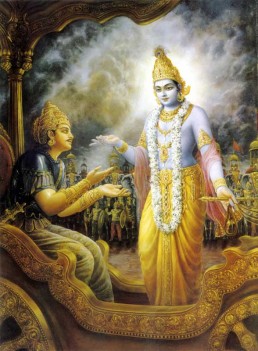Bhakti is selfless contemplation with a single-pointed mind upon the non-dual Brahman who is none other than the essence of the devotee himself. A constant attempt to live upto one’s own Real Nature is called single-pointed devotion. If a vicious sinner changes his evil thoughts his behavioral pattern gets transformed. If such a person worships The Lord with undivided devotion he is to be regarded as righteous and thoroughly rehabilitated.
From the moment contemplation on the Supreme is taken up with devotion, the sinner becomes a saint because he has formed a resolution to abandon the evil ways of his early life. He will soon grow out of himself into the spiritual glory. The evil of the past cannot be washed away except by his turning to God with undivided heart.
This verse does not mean that there is an easy escape from the consequences of our deeds. We cannot prevent the cause from producing its effect. Any arbitrary interference with the order of the world is not suggested. When the sinner turns to God with undistracted devotion, a new cause is introduced.
His redemption is conditional on his repentance. Repentance is a genuine change of heart and includes regret for the past sin and a decision to prevent a repetition of it in the future. When once the resolution is adopted, the transformation of the lower into higher is steadily effected.
If only human effort is to be depended upon for this change, it may be hard, erroneous, imperfect and difficult to overcome the ego. By surrendering the ego when one opens himself to the Divine, The Lord takes up the burden of changeover and lifts the soul to the spiritual plane from its contamination. A peace of charcoal loses its blackness only when it is charged with fire.

